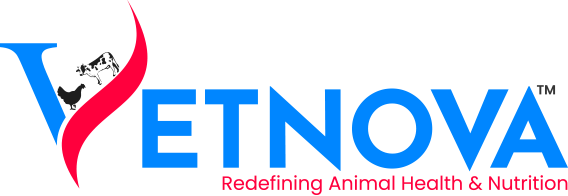Dairy Cow Nutrition: How to Feed and Balance the Diet Properly
For every dairy farmer, the foundation of a productive and profitable herd starts with one key factor, dairy cow nutrition. No matter how good your genetics or farm management is, if your cows’ diet isn’t properly balanced, you can’t expect consistent milk yield, good fertility, or long-term health. Understanding how to feed your cows smarter, not just more, is what turns average farms into successful ones.
This guide will help you understand the essentials of milk cow nutrition, how to balance your herd’s diet, and what supplements make the biggest difference to milk yield and quality while keeping the approach practical for Indian conditions.

Why Dairy Cow Nutrition Matters So Much
A dairy cow’s body is a complex biological system. It converts the nutrients from feed into milk, energy, and body maintenance. However, these nutrients need to be provided in the right proportions. Too much of one and too little of another can cause health imbalances, reduced milk yield, and poor fertility.
Many farmers ask, “If my cows are eating well, why is the yield still low?” The answer often lies in imbalanced nutrition. The cow may be getting enough bulk feed but not the right nutrient profile.
Proper dairy cow nutrition ensures:
- Consistent milk yield and fat percentage
- Improved SNF levels in milk
- Better reproductive performance
- Stronger immunity and fewer metabolic problems
Understanding the Dairy Cow Diet
A cow’s diet has four key nutritional pillars -energy, protein, fibre, and minerals. Getting this balance right is critical for both dairy cattle nutrient requirements and overall farm profitability.
- Energy: The Driving Force
Energy fuels all bodily functions from walking to milk production. If cows don’t get enough energy, they’ll draw from their body fat, leading to weight loss and lower milk yield. Common energy sources include maize, barley, green fodder, and silage.
- Protein: Building Block of Milk
Protein is crucial for muscle development and milk protein synthesis. Sources like soybean meal, mustard cake, and groundnut cake are excellent for fulfilling milk cow nutrition requirements.
- Fibre: The Digestive Regulator
Cows are ruminants they rely on roughage to maintain proper rumen function. A diet too low in fibre can lead to acidosis and digestion issues. Including good-quality hay, straw, or green fodder maintains healthy rumen movement and pH balance.
- Minerals & Vitamins: The Missing Link
Even when energy and protein are sufficient, cows often lack vital minerals. This is especially true in regions where soil mineral content is poor. Dairy cattle mineral supplements play a vital role here — providing calcium, phosphorus, zinc, copper, and selenium for bone strength, fertility, and immunity.
Balancing the Diet for Peak Performance
So how do you know if your dairy cow diet is properly balanced? It depends on body condition score (BCS), milk yield, and health performance.
To maintain the right balance:
- Combine 60–70% roughage with 30–40% concentrate.
- Provide clean, fresh water throughout the day.
- Ensure consistent feeding times to support rumen activity.
- Use rumen-protected amino acids like methionine to optimize protein utilization.
When Supplements Make the Difference
Even with the best feeding strategy, there are times when natural feed alone cannot meet the high demands of lactation. This is where supplements for dairy cows become essential.
- Bypass fat improves energy density without digestive disturbance.
- Rumen-protected methionine improves protein efficiency and milk yield.
- Chelated mineral mixtures ensure higher absorption of trace minerals for better health and fertility.
Vetnova’s approach to dairy nutrition focuses on bioavailable ingredients and science-backed formulations that bridge nutritional gaps without overloading the animal’s system. This ensures that cows convert more of what they eat into usable nutrients helping farmers achieve more milk per kilogram of feed.
How Dairy Cow Nutrition Affects Milk Quality
Milk quality isn’t just about volume. It’s also about SNF (Solids Not Fat) content, which determines the value of milk in the market. Low SNF usually means the cow’s energy or mineral intake is insufficient.
Balanced nutrition — with adequate energy and chelated minerals can increase SNF naturally. Supplementing with methionine and fat-soluble vitamins (A, D, E) supports udder health, improves milk composition, and enhances fat percentage.
The Vetnova Perspective: Science in Everyday Nutrition
While every farm’s conditions differ, the principle remains constant — better nutrition means better performance. Vetnova’s nutritional philosophy revolves around optimizing nutrient absorption, not just increasing feed quantity.
By understanding rumen biology and formulating precision supplements, Vetnova helps farmers achieve sustainable productivity aligning with both profitability and animal welfare.
Know more about SNF in cow milk –Click Here.
Conclusion
A well-balanced dairy cow diet is the foundation of profitable milk production. It’s not just about feeding more, but feeding smart with the right combination of energy, protein, fibre, vitamins and minerals.
By adopting a science-based approach and incorporating high-quality dairy cattle mineral supplements, farmers can unlock higher yields, improve milk SNF, and ensure long-term herd health. The goal isn’t short-term production boosts it’s sustained, efficient nutrition that keeps cows performing year-round.
Energy is the key driver of milk production. Without sufficient energy, cows cannot maintain yield or health, no matter how good the protein or minerals are.
Monitor milk yield, fat percentage, and body condition. If cows lose weight or milk fat drops, the diet needs rebalancing.
Yes. Even high-quality fodder may lack trace minerals due to soil depletion. Mineral mixtures fill these gaps.
It ensures that methionine reaches the intestine without being degraded in the rumen, improving protein efficiency and milk yield.
Absolutely. A balanced supply of energy, protein, and minerals directly influences SNF content and overall milk quality.
